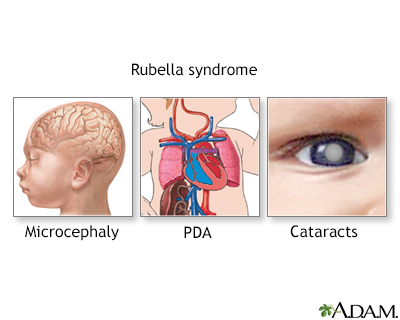Pregnancy SmartSiteTM
DefinitionCongenital rubella is a condition that occurs in an infant whose mother is infected with the virus that causes German measles. Congenital means the condition is present at birth. CausesCongenital rubella occurs when the rubella virus in the mother affects the developing baby in the first 3 months of pregnancy. After the fourth month, if the mother has a rubella infection, it is less likely to harm the developing baby. The number of babies born with this condition is much smaller since the rubella vaccine was developed. Pregnant women and their unborn babies are at risk if:
SymptomsSymptoms in the infant may include:
Exams and TestsThe baby's health care provider will order blood and urine tests to check for the virus. TreatmentThere is no specific treatment for congenital rubella. The treatment is symptom-based. Outlook (Prognosis)The outcome for a child with congenital rubella depends on how severe the problems are. Heart defects can often be corrected. Damage to the nervous system is permanent. Possible ComplicationsComplications may involve many parts of the body. EYES:
HEART:
CENTRAL NERVOUS SYSTEM:
OTHER: When to Contact a Medical ProfessionalContact your provider if:
PreventionVaccination prior to pregnancy can prevent this condition. Pregnant women who have not had the vaccine should avoid contact with people who have the rubella virus. ReferencesGans HA. Rubella. In: Kliegman RM, St. Geme JW, Blum NJ, et al, eds. Nelson Textbook of Pediatrics. 22nd ed. Philadelphia, PA: Elsevier; 2025:chap 294. Gershon AA. Rubella virus (German measles). In: Bennett JE, Dolin R, Blaser MJ, eds. Mandell, Douglas, and Bennett's Principles and Practice of Infectious Diseases. 9th ed. Philadelphia, PA: Elsevier; 2020:chap 152. Poland GA, Ovsyannikova IG, Kennedy RB. Rubella (German measles). In Goldman L, Cooney KA, eds. Goldman-Cecil Medicine. 27th ed. Philadelphia, PA: Elsevier; 2024:chap 339. | |
| |
Review Date: 4/6/2025 Reviewed By: Neil K. Kaneshiro, MD, MHA, Clinical Professor of Pediatrics, University of Washington School of Medicine, Seattle, WA. Also reviewed by David C. Dugdale, MD, Medical Director, Brenda Conaway, Editorial Director, and the A.D.A.M. Editorial team. The information provided herein should not be used during any medical emergency or for the diagnosis or treatment of any medical condition. A licensed medical professional should be consulted for diagnosis and treatment of any and all medical conditions. Links to other sites are provided for information only -- they do not constitute endorsements of those other sites. No warranty of any kind, either expressed or implied, is made as to the accuracy, reliability, timeliness, or correctness of any translations made by a third-party service of the information provided herein into any other language. © 1997- A.D.A.M., a business unit of Ebix, Inc. Any duplication or distribution of the information contained herein is strictly prohibited. | |

 Rubella on an infa...
Rubella on an infa... Rubella Syndrome
Rubella Syndrome
